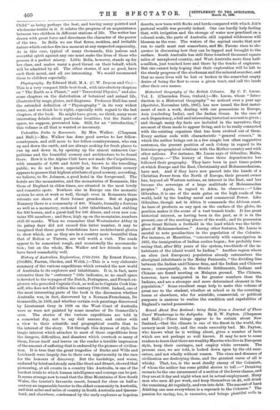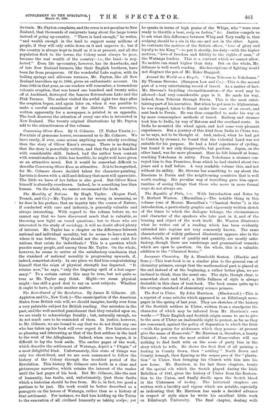Round About New Zealand : being Notes from a Journal
of Three Years' Wanderings in the Antipodes. By E. W. Payton. (Chapman and Hall.)—Three things appear to be certain about New Zealand,—that the climate is one of the finest in the world, the scenery most lovely, and the roads execrably bad. Mr. Payton, who knows what he is writing about, gives a number of facts which are not perhaps so well known. It may be new to some readers to learn that there are wealthy Maories who live in European style, keep their carriages, and employ white servants. The present race, we are told, is looked down upon by the old man- eaters, and not wholly without reason. The vices and diseases of civilisation are destroying them, and the greatest curse of all is whisky. That, too, is the most deadly enemy of the Colonists, of whom the author has some pitiful stories to tell :—" Drinking seems to be the one amusement of a section of the lower classes, and they are at it day and night when not in actual employment. Many men who earn £3 per week, and keep themselves on £1, will drink the remaining £2 regularly, and run into debt. The amount of hard drinking one sees everywhere is a reproach to the Colonies." The passion for racing, too, is excessive, and brings plentiful evils in its train. Mr. Payton complains, and the error is not peculiar to New Zealand, that thousands of emigrants hang about the large towns instead of going up-country. " There is land enough," he writes, "and wealth enough in the land to support many millions of people, if they will only settle down on it and improve it ; but if the country is always kept to itself as it is at present, and all the population flock to the towns, the Colony must always be poor, because the real wealth of the country—i.e., the land—is neg- lected." Even life up-country, however, has its drawbacks, and of late New Zealand farmers, like their English brethren, have been far from prosperous. Of the wonderful Lake region, with its boiling springs and siliceous terraces, Mr. Payton, like all New Zealand travellers up to 1886, gives an enthusiastic account. On June 10th in that year, as our readers will remember, a tremendous volcanic eruption, that was heard one hundred and twenty miles off at Auckland, destroyed the famous Rotomahana Lake and the Pink Terrace. The author visited the awful sight two days after the eruption began, and again later on, when it was possible to make a careful examination of the district. This narrative, written apparently for a newspaper, is printed in an appendix. The book deserves the attention of every one who is interested in New Zealand. The twenty original illustrations by Mr. Payton add to the attractiveness of the volume.



















































 Previous page
Previous page